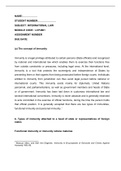Exam (elaborations)
LCP4801/ INTERNATIONAL LAW ASSIGNMENT O1 SOLUTIONS 2023 SEM 1
- Institution
- University Of South Africa (Unisa)
This document contains full answers for international law. All references included. Highest grade guaranteed. Whatsaap Silas on
[Show more]



